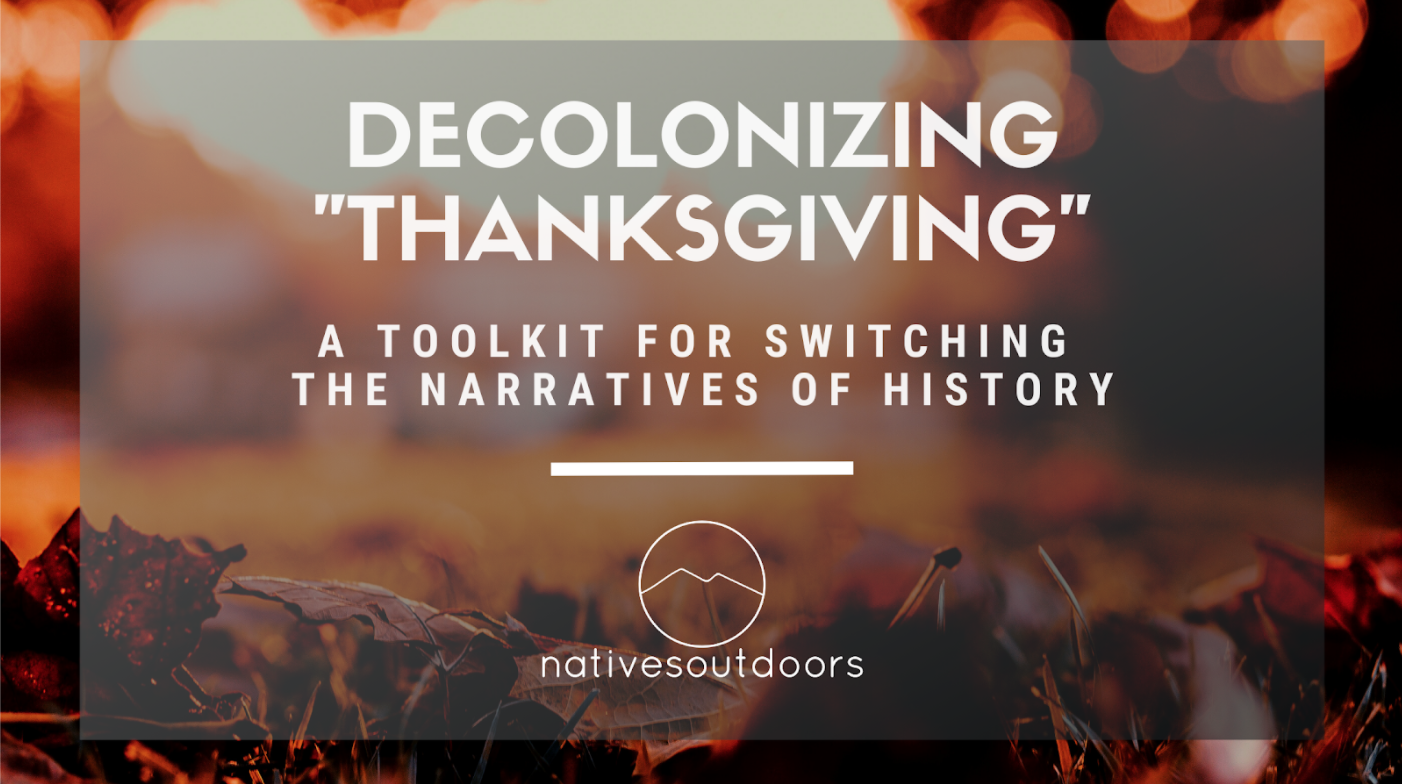Decolonizing “Thanksgiving”: A Toolkit for Switching the Narratives of History
Decolonize.
Indigenize.
We are hearing these words thrown around more and more often.
What does it mean to decolonize?
I can only speak from a personal lens of an Indigenous womxn and mother working every day to reclaim my own cultural knowledge and ways of being. I do not speak for all Indigenous people. To me, “decolonize” represents the process of integrating ancestral knowledge and practices to help unlearn the capitalist, colonial world I face every day. Decolonize means to dissect everything I think I know about how the world works and recreate a new world with one foot in modern times, using today’s technologies, and one foot firmly rooted in and embodying ancestral ways of knowing and being. To decolonize is to adapt using a cultural lens to thrive in a modern world.
Switching Narratives
Th*nksgiving is a triggering time for many Indigenous people. Like several other reminders in and around our worlds, Th*nksgiving (or ThanksTaking!) is an annual reminder of the begining of genocide of our people. YES, we still love food and gathering with our families, and communal preparation of meals is a core value held in native communities, however, to address any current issue or event, we need to step back and look at the eagle eye view of the whole story.
What is the true history? How does that continue to impact us today?
First, we must understand the significant value of LOCALIZED Indigenous knowledge. This means that the stories of specific events that happen to the peoples of that land, needs to come from those people. Indigenous stories and history need to be told by Indigenous people. What happened to my ancestors is unique to my history and bloodline. The history of “Thanksgiving” began with the Wampanoag Tribe. You can read an Interview from the Wampanoag perspective here.
Self-Participation
When we build awareness, we can begin to truly shift the narrative and our participation in that narrative. Once we become educated on different topics and true histories, we are able to make informed decisions based on our own mindfulness practices. My hope is always that people will step up and into a supportive role, not participating in or furthering colonized ways of thinking that are damaging to native communities once they’ve learned more about Indigenous world views.
Ask yourself these questions as we endure this colonial holiday:
How am I continuing to participate in or enable celebrating the genocide of Indigenous people, even if unintentionally?
How can I address my role in the holiday? (This can be at the dinner table, social media, conversations with friends etc..)
Am I being silent on this issue and is my silence hindering true change?
Dissect
Part of my own process of decolonizing is pulling apart and dissecting each value, holiday, tradition and my own upbringing within a colonial and Indigenous world. Once I’ve pulled apart all the elements that make up U.S. holidays, events and ways of thinking, I look at how I want my own world to look. What are the pieces I want to keep and what can I replace? I like sharing a beautiful meal with my family and will continue to convene in this way minus the sharing of inaccurate and harmful myths like the story of Th*nksgiving. Unfortunately, we are often fed the ways we are supposed to live through the media and established social norms, and they go unquestioned. I practice active resistance to this by creating and reframing norms, in my home and in my life. By choosing not to participate in the colonial norm and creating our own traditions with regard to and respect for true histories, we are dissecting and disregarding that which does not truly serve us as a society. In this way, we do not celebrate or commemorate the genocide of the original peoples of the lands we live on.
Indigenize
In many Indigenous cultures, we leave offerings and give thanks throughout the year. Some practice daily, during ceremonies or have specific offerings depending on the season or cultural event. If you wish to learn more — source out your LOCAL Indigenous knowledge of the lands you live on. If you have connection to your own Indigenous roots — what were the ceremonies and celebrations your ancestors carried throughout the year? Can you reclaim these traditions and implement them into your life?
Educate
It is my personal feeling that if we do not adjust to and share the information we’ve learned in support of true histories then we continue to participate in colonialism and genocide. Inaction and silence supports the oppressor and oppressive narratives. Allyship from non-Indigenous folks means stepping into an active role of educating others — so that the weight of reliving trauma is not another burden on Indigenous people.
Movement
If you have read this far and your initial response is, “we will just practice being grateful instead of celebrating Thanksgiving”, please pause and take a moment to recognize that this is a thought process only available from a place of privilege. Indigenous people continue to face systemic racism, genocide and barriers to basic human rights. By glossing over or continuing to further the white-washing of history , we continue to participate in the most abusive ascpects of colonialism and cultural genocide. We need to do better, and we can do better.
How are you deconstructing your colonial world view and reconstructing a reality for yourself and others in support of Indigenous peoples' lived history and ways of knowing and being?
Take Action
Refrain from furthering the harmful and incorrect narrative of “Thanksgiving”.
Amplify the voices of the people whose ancestors this genocidal celebration began with. Who are they and how do their descendants need your allyship?
Celebrate Indigenous strength and excellence with Native American Heritage Month (November) and every month!
Instead of supporting corporations during the holidays and on days like “Black Friday” that only serves the 1%, support Indigenous owned businesses. Vote with your wallet and focus your buying power through economic reconciliation and intention.
Know who’s land you live, work and play on. Acknowledge and internalize your findings.
Learn pronunciations of that land and language — this is the original language of the lands you now call home.
Educate two friends or family members
Ask those two friends or family members to do the same
Written by an Nlaka’pamux Warrior Womxn on Pentlatch Territory
Ecko Aleck
NativesOutdoors Ambassador
Founder/Artist of Sacred Matriarch Productions

